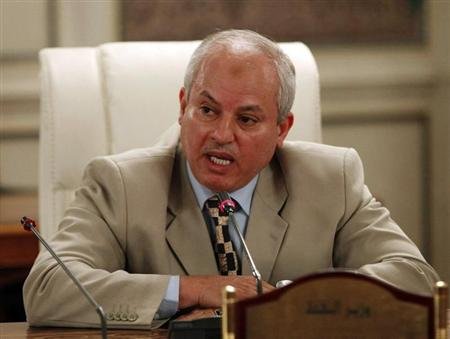
TRIPOLI (Reuters) – Libya has lost more than $7 billion and faces new competition from Algeria and Nigeria in oil markets due to strikes at oilfields and ports drying up exports, Oil Minister Abdelbari al-Arusi said on Saturday.
A mix of militias, tribesmen and civil servants have seized most oil ports and fields to demand more political power or higher pay, throttling Libya’s oil export lifeline.
The OPEC producer is facing turmoil as Prime Minister Ali Zeidan’s government struggles to control dozens of former militias which helped oust Muammar Gaddafi two years ago but which have refused to give up their arms.
Arusi said Libya had lost 9 billion Libyan dinars ($7.29 billion) in oil revenues after output had fallen to 250,000 barrels a day from 1.4 million bpd in July.
He did not say how much Libya is exporting, but his deputy told Reuters last week that up to 50 percent of output was being used to keep the 120,000 bpd Zawiya refinery running.
“We are facing a big problem because oil from Algeria and oil from Nigeria has entered the Mediterranean (market),” Arusi told al-Naba television station. “We have started looking for new markets in east Asia to offset the loss.”
He said he hoped export ports would start work soon but did not repeat comments from Wednesday that terminals might reopen on Tuesday.
Arusi said the government was having trouble drafting a 2014 budget due to the drop in production from 1.4 million bpd in July to 250,000 bpd now.
“We have a problem now. How are we supposed to prepare the budget?” he asked, adding that initial planning had assumed output of around 1.3 million bpd.
He said only the El-Feel field, offshore operations and fields belonging to state-owned Sirte Oil Co in central Libya were still producing oil.
Arusi said the abrupt halt in production had also damaged pipelines and other oil facilities, while some oil staff were in bad shape psychologically due to the strikes. “We are talking here about many cases, not just one” he said.
OUTAGES
He said the electricity supply would improve within hours after members of the Amazigh, or Berber, minority had ended a blockade of a gas pipeline feeding a power plant in western Libya which they had staged to demand more political rights.
However, outages again hit central parts of the capital Tripoli on Saturday.
Zeidan has failed to end strikes disrupting oil and gas supplies which started in earnest in the summer.
One difficulty is that protesters are not a unified group, but range from a regional autonomy movement in the east, civil servants seeking pay, and minorities like the Berbers who want their language recognised. Those demands are hard to meet for a prime minister weakened by political infighting.
Western powers worry the North African country will slide into instability with militias calling the shots in the streets while the government struggles to keep the budget running to pay civil servants and ease social tensions.








